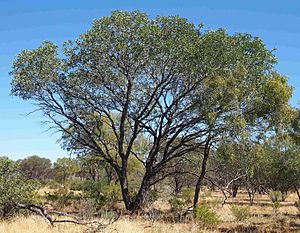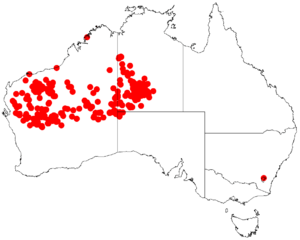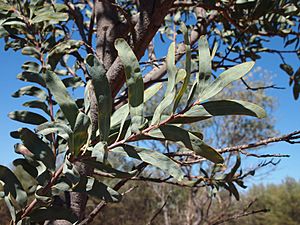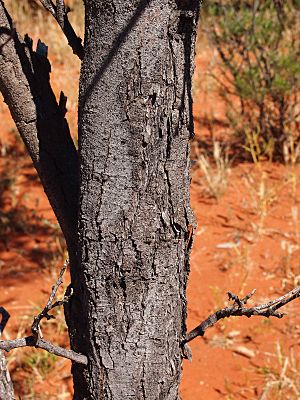Black gidgee facts for kids
Quick facts for kids Black gidgee |
|
|---|---|
 |
|
| Scientific classification |
|
| Kingdom: | Plantae |
| Clade: | Tracheophytes |
| Clade: | Angiosperms |
| Clade: | Eudicots |
| Clade: | Rosids |
| Order: | Fabales |
| Family: | Fabaceae |
| Clade: | Mimosoideae |
| Genus: | Acacia |
| Species: |
A. pruinocarpa
|
| Binomial name | |
| Acacia pruinocarpa |
|
 |
|
| Occurrence data from AVH | |
| Script error: The function "autoWithCaption" does not exist. | |
Script error: No such module "Check for conflicting parameters".
The Black Gidgee (scientific name: Acacia pruinocarpa) is a special type of tree found only in the dry, desert-like areas of Australia. It's also known as gidgee or tawu. This tree belongs to the pea family, called Fabaceae.
Contents
What is the Black Gidgee Tree?
The Black Gidgee is a tall, upright tree. It usually grows to be about 3 to 12 m (9.8 to 39.4 ft) (10 to 39 feet) high. Its trunk can become quite thick, sometimes over 2 m (6 ft 7 in) (6.5 feet) around!
What do its leaves and flowers look like?
Like many Acacia trees, the Black Gidgee doesn't have regular leaves. Instead, it has special flattened stems called phyllodes. These phyllodes are a grey-green color. They are usually 7 to 17 cm (2.8 to 6.7 in) (2.8 to 6.7 inches) long and 6 to 30 mm (0.24 to 1.18 in) (0.2 to 1.2 inches) wide. They are slightly curved and have a long, narrow shape. You can see a clear line down the middle, which is called the midrib.
This tree blooms, or flowers, between October and December. Its flowers are bright yellow and grow in round clusters. Each flower cluster is about 7 to 8 mm (0.28 to 0.31 in) (0.28 to 0.31 inches) wide. Inside each cluster, there are many tiny, golden flowers, usually between 55 and 110 of them!
What about its seeds?
After flowering, the Black Gidgee produces long, flat seed pods. These pods are pale brown and feel a bit like paper. They can grow up to 12 cm (4.7 in) (4.7 inches) long and 2 cm (0.79 in) (0.8 inches) wide. Inside the pods are dull black seeds. The seeds are oval-shaped and about 5 to 6 mm (0.20 to 0.24 in) (0.20 to 0.24 inches) long.
Where does the Black Gidgee grow?
The Black Gidgee tree is found all across the dry, central parts of Australia. You can find it from Carnarvon in Western Australia all the way east to the Tanami Desert in the Northern Territory. It also grows in the Mann Range in South Australia.
What kind of places does it like?
This tree loves to grow along watercourses, which are paths where water flows, and in low areas where water collects. It can live in many different types of places. You'll often see it in stony sand or loamy soils. It often grows alongside other Australian plants like Acacia aneura and spinifex grasses.
Who discovered the Black Gidgee?
The Black Gidgee was first officially described by a botanist named Mary Tindale. She wrote about it in 1968. Her work was published in a scientific paper called Contributions from the New South Wales National Herbarium.
 | Delilah Pierce |
 | Gordon Parks |
 | Augusta Savage |
 | Charles Ethan Porter |



